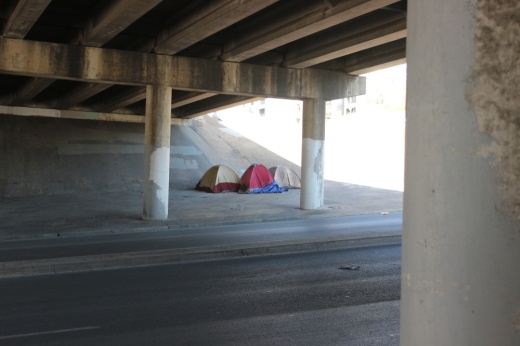The gist: ECHO’s report argues that while laws banning public encampments in nondesignated areas are “purportedly race-neutral,” they disproportionately harm Black people because they are six times more likely to experience homelessness compared to a white person, according to a 2022 report. ECHO attributes the racial disparity in homelessness to systemic racism in housing access, criminal justice, employment and education.
“If we look at the maps of where our unhoused population was last before they became unhoused, we see a very clear story that ties historic segregation to gentrification,” said Joao Paulo Connolly, organizing director for the Austin Justice Coalition, a nonprofit that collaborated with ECHO while creating the report. “[That] leads to an increase in our unhoused population, which very dramatically overrepresents Black people, particularly Black men, making up about 40% of the people experiencing unsheltered homelessness in our city.”
Dig deeper: The report criticizes Proposition B—a May 2021 ballot item that made public camping in nondesignated areas, “aggressive” panhandling, and sitting or sleeping on public sidewalks downtown illegal after it passed with 57% of the vote. The camping ban was also passed by the Texas legislature later that month.
In December, ECHO estimated that 4,656 people were experiencing homelessness in Austin and Travis County, up from 3,297 the year prior. Even if all of Austin’s homeless shelters were at capacity, 3,500 people would still be left unsheltered, according to ECHO. Further, plans to create sanctioned encampment sites fell through in the early stages, as the City Council struggled to find suitable locations and consider neighborhood concerns and zoning costs.
ECHO argues that by banning public camping, Prop. B violates article 2 and 3 of the Universal Declaration of Human Rights, which together state all people are entitled to life, liberty and security of person without distinction of race.
“These laws, by criminalizing the survival of people who are unsheltered, are in effect a violation of the human right to life,” said authors Claire Burrus, ECHO research and evaluation manager, and Akram Al-Turk, ECHO research and evaluation director, in the report. “In other words, people experiencing homelessness must forgo necessary survival measures to comply with these laws.”
Further, ECHO argues encampment bans will lead to unsheltered residents getting additional charges on their records.
About 75% of people seeking housing through the Homelessness Response System have spent time in a correctional facility, and about 50% have been denied housing due to having a criminal background, according to the report.
“With laws prohibiting camping in place, people experiencing homelessness are more likely to accumulate additional charges on their records. These laws perpetuate a cycle between criminal justice system involvement and homelessness, each contributing to the other, increasing the risk of long-term homelessness,” Burrus and Al-Turk said in the report.
Around the time Austin residents voted for Proposition B, the city ramped up on its Housing-Focused Encampment Assistance Link, or HEAL, program to shut down encampments and relocate its residents to housing shelters.
As of Feb. 14 when HEAL cleared an encampment at Pack Saddle Pass and Hwy. 71, the initiative has helped over 470 people voluntarily move into shelters.
The why: The report, released Feb. 24, was written in preparation for a United Nations group that will be traveling to the United States in April to research how Black people are treated by law enforcement.
The U.N. group, officially called the International Independent Expert Mechanism to Advance Racial Justice and Equality in the context of Law Enforcement, consists of three human rights law experts who will use reports such as ECHO’s to guide their research and interview process.
“I don’t know if this report will get the U.N.’s attention, but we thought it was worth a try,” Connolly said. “We have a relatively small unhoused population compared to cities like LA and New York, San Francisco. In many ways [we are] in a position to choose a different course, and it's not too late for us to really invest in housing, prioritize getting people off the streets and connected to housing resources and shelter.”
The city of Austin did not respond for comment before press time.





